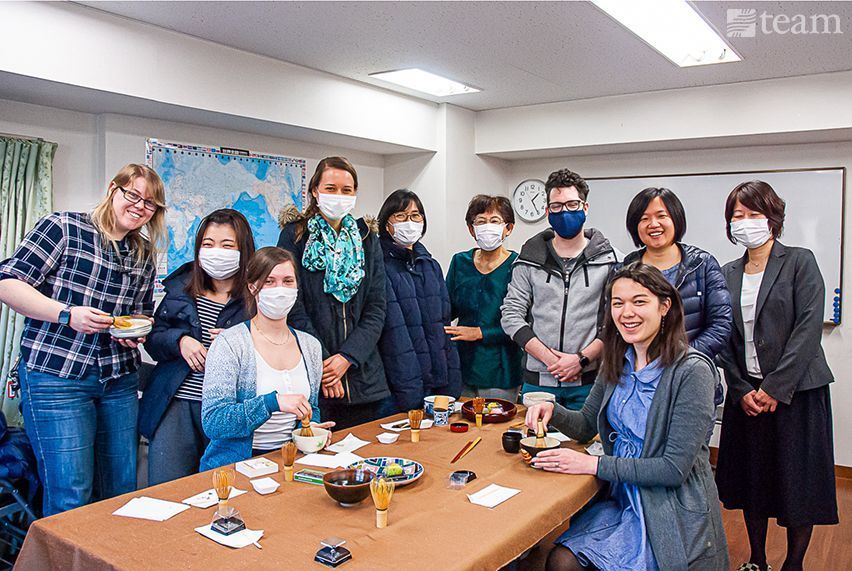If anyone is qualified to tell you how to pray for missionaries in language school, it’s Annie Wilson. After all, the TEAM missionary has gone to three kinds of language school in three countries: France , Chad and Mexico.
Stepping into her first ministry assignment, Annie thought learning a new language would be a breeze. After all, if God called her to ministry, He should make it easy, right?
“God definitely had to knock me down off my high horse and humble my heart within my first couple months of learning French,” Annie says now.
Language school lays a critical foundation for everything missionaries will do in their time abroad. But language school in a foreign country isn’t the same as your high school French class.
Every country has a different teaching style. When you walk out of the classroom, you’re still surrounded by the unknown language. You spend your days fumbling through new words as you try to buy groceries, navigate a new city and do all kinds of daily tasks. You lose the ability to express yourself or be known by those around you.
“Prayer for the physical, emotional and spiritual health of the missionary is crucial,” Annie says. “All these things tie together in language school and all those areas get depleted and challenged during this time.”
This month, we’re lifting up missionaries in this critical, early stage of ministry. Will you pray with us for missionaries in language school?
Sign up here to get the new Prayer Focus in your inbox every month
1. Pray for perseverance, even as the mistakes add up.

Most TEAM missionaries spend their first two years in language school. Success takes long hours of study and practice — and willingness to make mistakes. Photo courtesy of Sarah Lo.
Learning and living in a new language is exhausting and, often, humiliating.
“I think there’s a saying, something like, ‘It takes a million mistakes to become fluent in a second language,’” says TEAM Japan missionary Tori Jansson, “but … the saying doesn’t quite capture how dumb you feel after making mistake number 576,858.”
For most people, moving abroad means going through a season where you feel more like a child than the competent adult you were back home . But continuing to study and practice with locals is vital if you’re going to succeed in ministry.
“Language learners like us would love prayer for courage,” says TEAM Taiwan missionary Sarah Lo. “It takes courage to use the little bits of language we know with our friends and neighbors!”
Ask God to give missionaries renewed energy as they tackle their homework . Pray for good conversations with locals, even with their limited language skills.
2. Pray for understanding of both the language and the local teaching style.

Missionaries in language school learn both communication and culture. Erin (front right) and Nick (third from right) enjoyed a tea ceremony with their class. Photo courtesy of Erin Petkoff.
It’s hard to appreciate how different our languages are until you’re studying a new one in depth. The grammar, the pronunciations and even the cultural priorities can vary wildly. Not only that, but different cultures teach in different ways.
“There were many times I didn’t agree with how we were learning or the speed we were going, but I had to learn to trust the process,” Annie says.
Additionally, Annie says new missionaries have to let go of their expectation that other languages will be at all like their heart languages: “It’s a matter of humbling yourself to learn different ways to speak.”
Pray for missionaries to catch on quickly to each host culture’s language and teaching style. Ask God to make all the pieces fit together smoothly in their minds.
3. Ask God to use this season to reshape missionaries and build their faith.
The challenges of language school make it a unique season for missionaries to grow in their faith and understanding of God.
“Time and time again, God shows us how little we know … and reminds us to rely on Him for everything — even down to the basic necessity of communication,” says Erin Petkoff, a TEAM missionary to Japan.
In the months and years ahead, these missionaries will trust God for far bigger things than a passing grade in language school. They will ask God to heal individuals, to transform communities and to save nations from their sins.
Ask God to use this time to build great faith in these new missionaries . Pray that each frustration will lead language school students into deeper dependence on God. And pray that missionaries will be a light to their classmates and neighbors, even now.
Click here to download a printable copy of this month’s Prayer Focus!




















